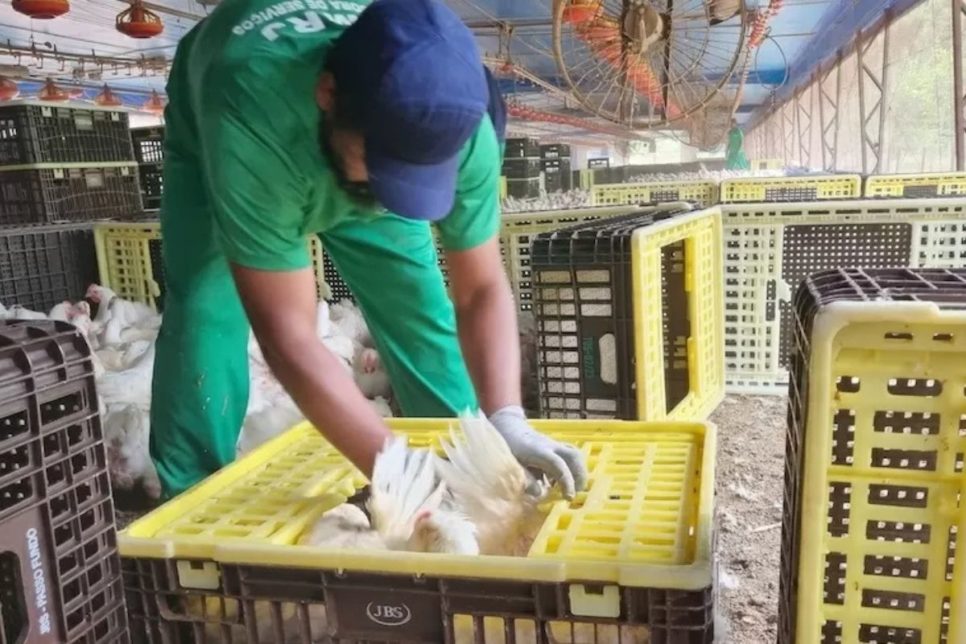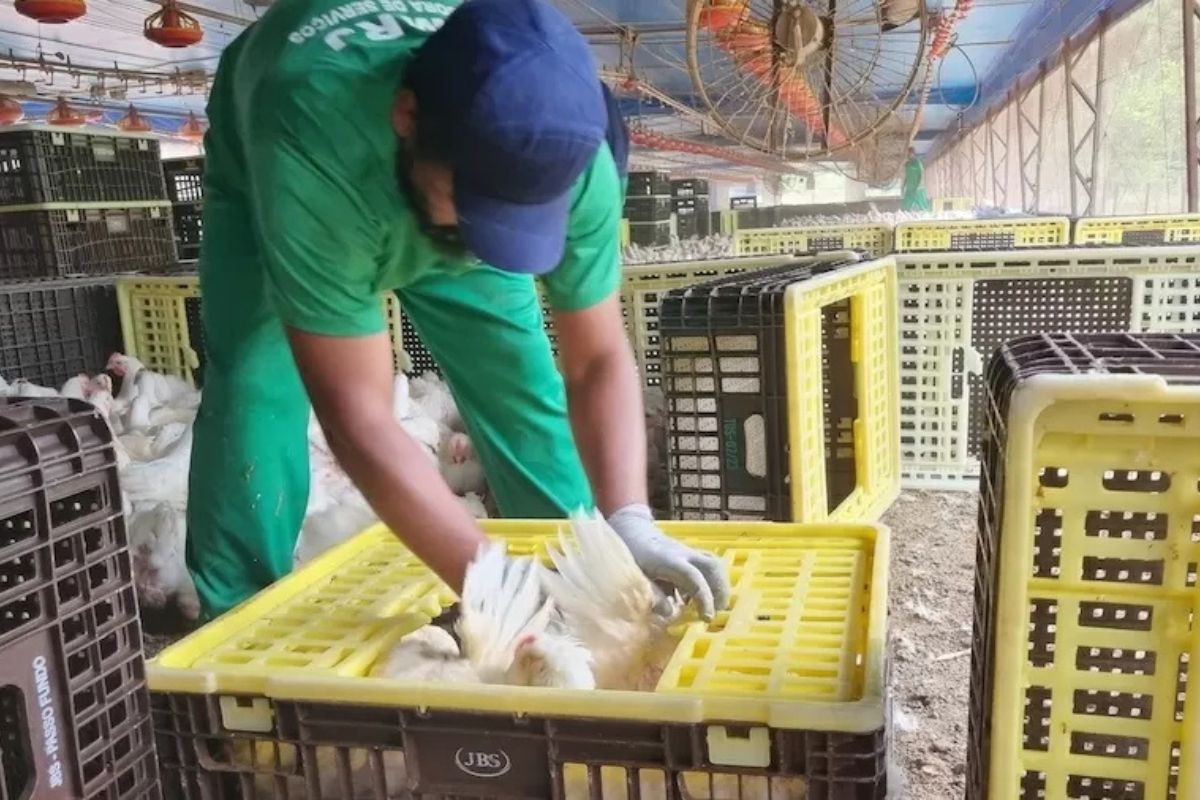Workers in vulnerable conditions expose the precariousness of labor rights in Brazil
International Labour Organization notes that the economic slowdown could drive an increase in the acceptance of degrading jobs, intensifying inequality; understand what is meant by precarious work
 Ginásio em Bento Gonçalves (RS) vira alojando para trabalhadores resgatados em vinícolas. Foto: Divulgação
Ginásio em Bento Gonçalves (RS) vira alojando para trabalhadores resgatados em vinícolas. Foto: Divulgação
“We went in search of a dream, to earn our own money and help support our families, but when we got there it was a nightmare,” a worker rescued from a vineyard in Bento Gonçalves, in the state of Rio Grande do Sul, said on the podcast ‘O Assunto’. He is part of a group of 207 men who left the state of Bahia to pick grapes, with the promise of receiving accommodation, food and a salary of up to 4,000 reais per month, but ended up working in slave labor conditions. The promise was made by the company Fênix Serviços Administrativos e Apoio à Gestão de Saúde Ltda, which provided services to the vineyards Aurora, Cooperativa Garibaldi and Salton.
According to testimonies, the workers received spoiled food and were forced to take on exorbitant debts from establishments close to their accommodation, where they were “treated like animals”. Beaten with broomsticks and sprayed with pepper spray, they were awakened with electric shocks at around 4 am and were forced to work until 9 pm with no breaks.
On February 22, the Ministry of Labor and Employment, the Office of the Public Prosecutor for Labor Issues and the Federal Police and Federal Highway Police staged an operation in which they confirmed the degrading work conditions.
Read more
The situation of the workers in Bento Gonçalves is consistent with the observations made in a new report by the International Labour Organization (ILO), released earlier this year. According to the report, the current global economic slowdown will force increasingly more workers to accept precarious, low-paying jobs without social protection, further reinforcing the inequalities exposed by the pandemic. Precarious working conditions are those that violate the rights and dignity of workers and may include, among other things, long hours, incorrect or lack of payment, insecurity and lack of social and labor protections.
The ILO estimates that the growth in the number of global jobs in 2023 will be just 1%, less than half what it was in 2022. As a result, global unemployment is expected to reach nearly 208 million people, which corresponds to a rate of 5.8%. Furthermore, with prices rising faster than nominal wages, more people will be pushed into poverty, leading to an increase in the number of people who subject themselves to degrading working conditions out of necessity.
“The need for more decent work and social justice is clear and urgent. But if we are to meet these multiple challenges, we must work together to create a new global social contract,” said Gilbert F. Houngbo, director-general of the ILO.
Restoring dignity
Actions taken by the current government are already addressing the growing insecurity of labor in Brazil. In January, President Lula announced the creation of a working group responsible for eliminating imbalances in relations between employees and employers. The idea is for the proposed measures to be sent for debate in the National Congress. The initiative is in line with the campaign promise to create new labor legislation, with “special attention” on workers “mediated by apps and platforms”.
However, many such measures will have to be adopted to recover from the setbacks caused by the government of Jair Bolsonaro, who, on his first day in office, in 2019, abolished the Labor Ministry, turning it into a secretariat reporting to the Ministry of Economy before it was restored it in 2021. Meanwhile, the civil society participation mechanisms, as well as the oversight structures, were continually dismantled.
“As a result of this [the abolition of the ministry], the labor agenda was excluded from the core of the executive branch for nearly two years, with no central body to prepare employment policy and respond to the demands of workers with increasingly less stability,” said Marina Novaes, of the Business & Human Rights Resource Centre (BHRRC), in the live video to launch the document “Dismantling and setbacks in the system to combat slave labor in Brazil”, drafted by Conectas, BHRRC (Business and Human Rights Resource Centre), ADERE/MG (Rural Workers Alliance of the State of Minas Gerais), Oxfam Brasil and CONTAR (National Confederation of Salaried Rural Workers).
In addition, said Novaes, the Bolsonaro government sought to restructure the labor protection bodies, abolishing councils and commissions that were part of the national policy on public participation.
As highlighted in the report, inspections of working conditions have also been steadily decreasing. “Over the past ten years, the number of inspectors has fallen from 2,935 in 2010 to just 2,050 in 2013 – not enough to cover all the regions of the country, especially the most remote areas – making it difficult to monitor compliance with government labor standards,” reads the document, while also noting that the government prevented inspectors from securing funds through other means, by preventing the allocation of money received from fines and penalties for collective moral damages by the Office of the Public Prosecutor for Labor Issues.
The situation is compounded even further by the inability to hold offenders accountable for crimes and to ensure adequate compensation for victims. As stated in the document, of the 3,450 slave labor inspection operations carried out between 2008 and 2019, only 2,679 defendants were reported for the crime and, of these, only 112 received a final conviction, which corresponds to 4.2% of all defendants and 6.3% of all the people brought to trial.
Transparency, in the form of the disclosure of the list of offenders, known as the “dirty list”, is considered a successful strategy for combating slave labor in Brazil. This is despite the fact that the government does not require companies to publicly disclose data and information on their production chains – which makes it difficult to oversee and hold accountable all parties involved in the practice of slave labor, but nevertheless indicates an important course of action.
“It is worth mentioning that our efforts to stop a civilizational setback are important, as we cannot permit companies and governments to prevent us from listening, participating, giving our opinions, making decisions and protesting,” said Marina Novaes. “And that the protection of Brazilians from human rights violations caused by the operations of companies is an urgent matter for the construction of a fair and sustainable country.”
Conectas, OECD Watch and FIDH (International Federation for Human Rights) also assessed Brazil’s policies and practices in this area in the context of the country’s attempts to join the OECD (Organization for Economic Co-operation and Development). The study “Labor rights and social protection in Brazil – shortcomings in governance”, conducted by the organizations, found that the relaxation of labor laws in the country in recent years has caused insecurity for many workers. The document states, for example, that Brazilian fruit farming “is a sector beset with appalling working conditions. Most of the men and women who work in the fruit production chain live in a situation of extreme vulnerability, without employment contracts that last more than 6 months and without living wages that can provide a decent life for themselves and their families.”
Racism and precarious work
There is also a key racial component to this discussion. In the case of the vineyards, for example, of the 207 rescued workers, 95% describe themselves as people of color (64% dark-skinned and 31% black), according to data from the federal government released by UOL. “Precarious work is yet another cruel consequence of our slave-owning past, which has been updated over time. Offering decent work to the population is also a way of tackling structural and systemic racism,” said Júlia Neiva, director of Strengthening the Human Rights Movement and coordinator of the Defense of Socioenvironmental Rights program at Conectas.
She added that it is time for Brazilian society to take a stand against all forms of precarious work, including contemporary slavery. “It must be a broad stand that includes accountability for companies and a commitment from governments. There is no doubt that we are living through an economic and social transformation. Some professions that existed in the past no longer make sense anymore, whereas new occupations and new labor relations have arisen, in both the city and the countryside. These changes, however, must not result in insecurity and loss of rights. On the contrary, the law needs to keep up and be complied with in full. We cannot accept, for example, modern technology companies establishing archaic labor relations”, said Neiva.






